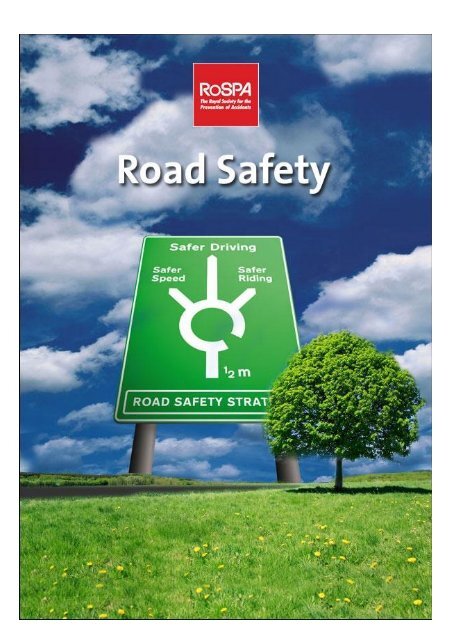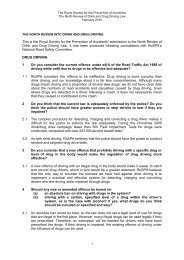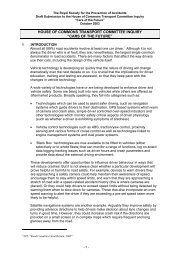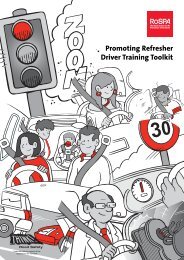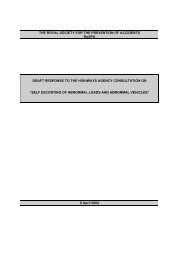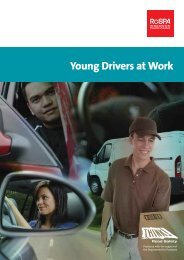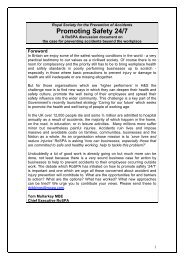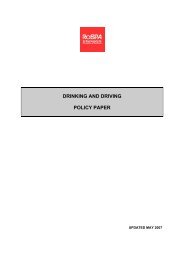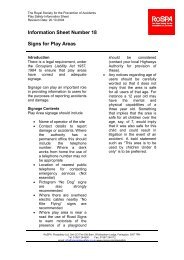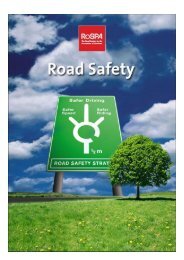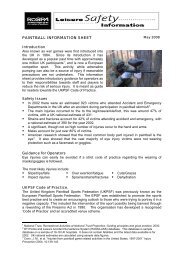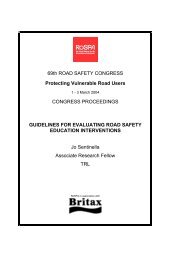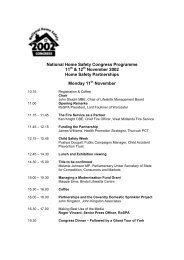RoSPA Road Safety
RoSPA Road Safety
RoSPA Road Safety
Create successful ePaper yourself
Turn your PDF publications into a flip-book with our unique Google optimized e-Paper software.
<strong>RoSPA</strong>‟s <strong>Road</strong> <strong>Safety</strong> Work<br />
January 2010<br />
CONTENTS<br />
Introduction 1<br />
<strong>Road</strong> <strong>Safety</strong> 2<br />
Advice, Help, Training and Information 3<br />
<strong>Road</strong> <strong>Safety</strong> Education 7<br />
Supporting Professionals and Practitioners 12<br />
Helping Employers 16<br />
Supporting National <strong>Road</strong> <strong>Safety</strong> Strategies 23<br />
<strong>RoSPA</strong> <strong>Road</strong> <strong>Safety</strong> in Wales 27<br />
<strong>RoSPA</strong> <strong>Road</strong> <strong>Safety</strong> in Scotland 29<br />
<strong>RoSPA</strong> <strong>Road</strong> <strong>Safety</strong> in Europe and Beyond 31
<strong>RoSPA</strong>‟s <strong>Road</strong> <strong>Safety</strong> Work<br />
January 2010<br />
INTRODUCTION<br />
<strong>RoSPA</strong> is an independent, registered charity which was created in 1917 in response to an<br />
'alarming increase in traffic accidents‟ in London. Today, <strong>RoSPA</strong> promotes safety in all areas<br />
of life – on the road, in the home, at work, in schools, at leisure and on or near water. Our<br />
aim is to Save Lives and Reduce Injuries.<br />
The breadth of <strong>RoSPA</strong>‟s expertise allows us to draw lessons from different areas, schools of<br />
thought and approaches to injury prevention. Indeed, this is how <strong>RoSPA</strong> began its Managing<br />
Occupational <strong>Road</strong> Risk campaign in 1996, which has led to „at-work road safety‟ being a<br />
key priority in the UK‟s road safety strategy today. Other examples of <strong>RoSPA</strong>‟s contribution<br />
to road safety over the years include the formation of a national network of local road safety<br />
committees (the forerunner of today‟s local authority road safety officer service), the National<br />
Cycling Proficiency Scheme, the Tufty Club, compulsory seat belt wearing (<strong>RoSPA</strong>‟s<br />
President introduced an amendment to the Transport Bill in 1981), and the ban on using a<br />
hand-held mobile phone while driving.<br />
<strong>Safety</strong> organisations can be accused of taking safety problems too seriously and<br />
encouraging „hypersafety‟, „excessive risk aversion‟ and the „nanny state‟. However,<br />
“Absolute safety” is neither feasible nor desirable, since it would come at such cost to our<br />
freedoms. Common sense and balance is essential when developing and promoting safety<br />
interventions. There are clearly areas where prescription, through regulation, legislation or<br />
standards, is essential, for example, the nuclear, chemical or aviation industries. On the<br />
other hand, people need to be able to get on with their lives and be free to decide what risks<br />
they wish to take, provided they are not putting others in danger.<br />
The difficulty is where to draw the line - too prescriptive, and accusations of the “nanny state”<br />
fly around; too casual and people would undoubtedly be forced to take unknowing risks.<br />
<strong>RoSPA</strong> draws the line with two simple questions:<br />
1) Is the intervention proportionate to the risk? If the<br />
problem is not that great, steer towards the lighter<br />
touch, but if the evidence demands more<br />
guidance, consider intervention.<br />
2) What would be the effect on others? Someone<br />
who puts only themselves at risk should have the<br />
freedom to do so; but if an act can kill or injure<br />
others, it must be proscribed or regulated. A solo<br />
mountain climber fits into the first category; a<br />
speeding motorist the second.<br />
<strong>RoSPA</strong>‟s Approach to <strong>Safety</strong> is discussed in further detail in our Chief Executive‟s Reports<br />
for the 2007/08 Annual Review and 2008/09 Annual Review, and in “<strong>Safety</strong>: A Short <strong>RoSPA</strong><br />
Guide to Key Concepts”.<br />
1
<strong>RoSPA</strong>‟s <strong>Road</strong> <strong>Safety</strong> Work<br />
January 2010<br />
ROAD SAFETY<br />
Great Britain has one of the best road safety records in Europe and the world. Despite<br />
massive increases in traffic over the last few decades, the number of people killed on our<br />
roads has fallen from around 5,500 per year in the mid 1980s to just over 2,500 in 2008.<br />
However, this still means that around 7 people die on Britain‟s roads every day.<br />
<strong>Road</strong> Casualties in Great Britain, 2008<br />
Killed 2,538<br />
Seriously Injured 26,034<br />
Slightly Injured 202,333<br />
All 230,905<br />
Common causes of these unnecessary tragedies include:<br />
Speeding<br />
Over 700 people a year are killed in crashes in which someone exceeds the speed limit or<br />
drives too fast for the conditions.<br />
Drink Driving<br />
Over 450 people die a year in crashes in which someone was over the legal drink drive limit.<br />
Seat Belt Wearing<br />
Nearly 400 lives each year could be saved if everyone always wore their seat belt.<br />
Careless Driving<br />
Over 400 deaths a year involve someone being „careless, reckless or in a hurry‟.<br />
At-work<br />
Around one third of fatal and serious road crashes involve someone who was at work.<br />
Inexperience<br />
Over 300 newly-qualified drivers and their passengers are killed in car crashes a year.<br />
<strong>Road</strong> safety is one of the most important areas of <strong>RoSPA</strong>‟s work. As almost all road crashes<br />
involve human error, ranging from simple mistakes to deliberate dangerous and illegal<br />
behaviour, our key issue is the need to improve the standard of driving and riding. <strong>RoSPA</strong><br />
supports a twin-track approach of making it as easy as possible to use the roads safely and<br />
responsibly and voluntarily and willingly comply with road traffic law, and of increasing the<br />
likelihood of catching, and the punishment for, those who choose not to do so.<br />
<strong>RoSPA</strong>:<br />
Raises awareness and provides advice, help, training and information for all road users<br />
and the general public<br />
Provides road safety education resources and guidance<br />
Provides advice and guidance, practical products and services to help employers<br />
manage their occupational road risk<br />
Supports the work of other professionals and practitioners in road safety<br />
Supports the development and implementation of national road safety strategies<br />
2
<strong>RoSPA</strong>‟s <strong>Road</strong> <strong>Safety</strong> Work<br />
January 2010<br />
ADVICE, HELP, TRAINING AND INFORMATION<br />
<strong>RoSPA</strong> provides advice, information, education, training and publicity resources and services<br />
for many different audiences: the public, safety professionals and practitioners, schools and<br />
other educational establishments, employers and the government.<br />
The Public<br />
<strong>RoSPA</strong> runs a <strong>Road</strong> <strong>Safety</strong> Information Service, with funding from the Department for<br />
Transport, to provide free, simple and clear information and advice to the public. <strong>RoSPA</strong> staff<br />
answers thousands of road safety enquiries from the public by email, letter or phone each<br />
year.<br />
Online Advice<br />
Through its many websites, <strong>RoSPA</strong> provides advice and information to millions of people<br />
worldwide every year, offering clear solutions to practical problems. Between them, the<br />
websites attract 70+ million hits, 3.6 million visitors and nearly a million downloads per year.<br />
www.rospa.com/roadsafety<br />
<strong>RoSPA</strong>‟s main website, www.rospa.com, includes a<br />
comprehensive road safety section,<br />
www.rospa.com/roadsafety, containing a wide range<br />
of free road safety resources for drivers, riders,<br />
schools, parents and employers, advice and<br />
information factsheets on many road safety topics<br />
and copies of <strong>RoSPA</strong> responses to road safety<br />
consultations.<br />
The road safety section receives around 700,000 visits each year and road safety documents<br />
are downloaded around 600,000 times<br />
www.childcarseats.org.uk<br />
<strong>RoSPA</strong>‟s website on child car seats provides<br />
free advice on choosing, fitting and using<br />
child car restraints, and receives 700,000<br />
visits a year, with advice sheets being<br />
downloaded around 40,000 times.<br />
www.helpingLdrivers.com<br />
<strong>RoSPA</strong>‟s website to provide help and advice<br />
to parents who have children who are<br />
learning to drive or ride,<br />
www.helpingLdrivers.com, receives over<br />
87,000 visits each year<br />
3
<strong>RoSPA</strong>‟s <strong>Road</strong> <strong>Safety</strong> Work<br />
January 2010<br />
www.orsa.org.uk<br />
<strong>RoSPA</strong> runs the website of the Occupational<br />
<strong>Road</strong> <strong>Safety</strong> Alliance, designed to help<br />
employers manage work related road safety,<br />
which receives over 55,000 visits and<br />
documents are downloaded over 15,000<br />
times.<br />
www.stoppingdistances.org.uk<br />
<strong>RoSPA</strong>‟s online simulator is designed to<br />
highlight the effect speed and driver<br />
impairment has on pedestrian safety, and is<br />
used 100,000 times a year.<br />
<strong>RoSPA</strong>‟s other safety related websites include www.youngworker.co.uk,<br />
www.lasersafety.org.uk, www.saferfireworks.com and www.roadar.org.<br />
Twitter<br />
<strong>RoSPA</strong> is also taking advantage of the latest communication tools, having recently launched<br />
a number of twitter sites, including twitter.com/roadsafety and twitter.com/rospa. Twitter is a<br />
'microblogging' platform which allows users to post short text messages (up to 140<br />
characters in length) via the internet. It‟s a great way of keeping in touch with people by<br />
exchanging quick, frequent emails about „what you‟re doing‟.<br />
Media<br />
Another crucial way that <strong>RoSPA</strong> promotes road safety<br />
information, advice and comment is through the media.<br />
In the past year, <strong>RoSPA</strong> has been quoted in thousands<br />
of newspaper articles, written dozens of road safety<br />
features and carried out around 400 road safety<br />
television and radio broadcasts.<br />
Common road safety themes have been:<br />
Drivers using mobile Young and novice Drinking and<br />
phones<br />
drivers<br />
driving<br />
Speed-related<br />
New offences<br />
Changes to<br />
issues, including (especially Corporate prosecution<br />
speed limits, traffic Manslaughter and and<br />
calming, safety Causing Death by sentencing<br />
cameras<br />
Careless Driving) guidelines<br />
Driving for work Child seats and seat Child road<br />
belts<br />
safety<br />
Driving in wintry The state of Britain‟s Councils<br />
weather conditions roads<br />
switching off<br />
street lights<br />
Pedestrian safety Mobility scooters Older drivers<br />
Lighter<br />
evenings<br />
Uninsured<br />
and<br />
unlicensed<br />
drivers<br />
Cycling<br />
safety<br />
<strong>Safety</strong> on<br />
rural roads<br />
4
<strong>RoSPA</strong>‟s <strong>Road</strong> <strong>Safety</strong> Work<br />
January 2010<br />
Some of the more unusual road stories <strong>RoSPA</strong> has dealt with over the last year include a<br />
driver watching a DVD while driving, another carrying a large palm tree and petrol being<br />
siphoned from cars due to the recession.<br />
Individual <strong>Road</strong> Users<br />
With DfT funding, <strong>RoSPA</strong> has produced a wide range of free resources for specific road<br />
users: drivers, motorcyclists, pedestrians, pedal cyclists, and parents. These can be found at:<br />
www.rospa.com/roadsafety/resources/drivers.htm<br />
www.rospa.com/roadsafety/toptentips/index.htm<br />
www.stoppingdistances.org.uk/<br />
www.rospa.com/roadsafety/resources/motorcyclists.htm<br />
www.rospa.com/roadsafety/resources/pedalcyclists.htm<br />
www.rospa.com/roadsafety/resources/parents.htm<br />
www.childcarseats.org.uk/<br />
www.helpingldrivers.com/<br />
In addition, many other resources are produced for sale, and can be used as part of<br />
education or training initiatives or as standalone resources to raise awareness and improve<br />
knowledge.<br />
5
<strong>RoSPA</strong>‟s <strong>Road</strong> <strong>Safety</strong> Work<br />
January 2010<br />
<strong>RoSPA</strong> Advanced Drivers and Riders (ROADAR)<br />
<strong>RoSPA</strong> Advanced Drivers and Riders is a network of over 50 local<br />
groups around the UK, whose aim is to reduce road accidents by<br />
encouraging an interest in road safety and by improving driving and<br />
riding standards, knowledge and skill. The Groups, many of which<br />
have motorcycle sections, have trained and experienced tutors<br />
willing to offer free advice, assessments and support to help drivers<br />
and motorcyclists prepare for the <strong>RoSPA</strong> Advanced Driving test or<br />
the <strong>RoSPA</strong> Advanced Motorcycling test.<br />
ROADAR began life in 1955, when Louise Duncan and others formed, the Finchley League<br />
of Safe Drivers. They organised lectures by the police and, together with some on-the-road<br />
training, eventually instituted a system of testing run by police driving instructors from<br />
Hendon. The organisation grew and spread across the country, and in April 1960, the<br />
League of Safe Drivers was formed. It had two patrons, Mrs Margaret Thatcher (MP for<br />
Finchley) and Mr. Raymond Baxter. The League required its members to take tests at regular<br />
intervals and offered a three tier grading system.<br />
In 1980, <strong>RoSPA</strong>, which had been involved with the organisation from the earliest days, took<br />
over the League, which became the <strong>RoSPA</strong> League of Safe Drivers, and in 1982, the <strong>RoSPA</strong><br />
Advanced Drivers' Association. The Association has gone from strength to strength ever<br />
since, due in large measure to the enthusiasm and commitment of the local groups and the<br />
quality and consistently high standard of the tests conducted by the examiners.<br />
The current name, <strong>RoSPA</strong> Advanced Drivers and Riders, reflects the changing membership<br />
profile, and includes all motorists, riders of motorcycles and scooters as well as car and other<br />
drivers. Membership is open to those who have taken or who wish to train towards taking the<br />
Advanced Test. There are two types of membership:<br />
Associate member: Joined a RoADAR group to prepare for the advanced driving test.<br />
Full member: Have passed the advanced driving test, and take a re-test every three years to<br />
maintain their membership.<br />
One of the strengths of <strong>RoSPA</strong> Advanced Drivers and Riders is that all members are<br />
required to take regular, free re-tests.<br />
6
<strong>RoSPA</strong>‟s <strong>Road</strong> <strong>Safety</strong> Work<br />
January 2010<br />
ROAD SAFETY EDUCATION<br />
<strong>RoSPA</strong>‟s <strong>Road</strong> <strong>Safety</strong> and <strong>Safety</strong> Education Departments work<br />
together to produce a wide range of educational resources to help<br />
teachers and schools incorporate road safety education into the<br />
school curriculum and into normal lessons on maths, English, etc.<br />
Educational resources are produced for all age ranges, from preschool<br />
age children to young people who are graduating from school<br />
and beginning their working life.<br />
In addition to education resources, <strong>RoSPA</strong> also produce good practice guidelines for<br />
incorporating safety into wider school activities (for example, “”<strong>Road</strong> <strong>Safety</strong> Education: A<br />
Guide for healthy Schools” or “Dramatic Impact: A Guide for Commissioning Theatre-in-<br />
Education”) or for managing safety in schools (for example, “Minibus <strong>Safety</strong>; A Code of<br />
Practice”).<br />
Many of the resources are available free of charge, thanks to funding from the Department<br />
for Transport, and can be found at www.rospa.com/roadsafety/resources/teachers.htm.<br />
7
<strong>RoSPA</strong>‟s <strong>Road</strong> <strong>Safety</strong> Work<br />
January 2010<br />
Learning About <strong>Safety</strong> by Experiencing Risk (LASER)<br />
LASER is a powerful interactive approach to safety education that takes place outside the<br />
classroom. Its purpose is to educate and enable children so that they can begin to take some<br />
care of themselves and others in their immediate community.<br />
LASER schemes provide children with opportunities to learn about and practise personal life<br />
skills, encouraging them to recognise and deal with the challenges and opportunities they<br />
might encounter throughout life, including in the home, when travelling or doing leisure<br />
activities.<br />
There are about 200 LASER schemes operating around England. Some run all-year-round at<br />
permanent venues and others are annual events that open for one to four weeks in a variety<br />
of locations. The emergency services and local authority staff play a key role in many events.<br />
Schemes run under various names (for example, Crucial Crew, Junior Citizen or <strong>Safety</strong><br />
Rangers).<br />
With funding from the Department of Health, <strong>RoSPA</strong> identified all<br />
the schemes across the country, drew together good practice<br />
and published the “LASER Project Good Practice Guidelines”.<br />
These can be downloaded free from<br />
www.rospa.com/safetyeducation/laser/goodpractice.htm<br />
<strong>RoSPA</strong> then helped to form a voluntary Alliance of LASER Scheme providers to spread good<br />
practice and establish future standards, and since 2005, has been undertaking a programme<br />
of voluntary accreditation.<br />
<strong>RoSPA</strong> hosts the LASER Forum website, www.lasersafety.org.uk, which gives locations and<br />
contact details for permanent and annual schemes across the UK.<br />
8
<strong>RoSPA</strong>‟s <strong>Road</strong> <strong>Safety</strong> Work<br />
January 2010<br />
Child <strong>Safety</strong> Education Coalition (CSEC)<br />
<strong>RoSPA</strong>, in partnership with the National Children‟s Bureau (NCB), and with funding from the<br />
DCSF, established a new organisation called the Child <strong>Safety</strong> Education Coalition in 2009.<br />
CSEC now has over 70 member organisations.<br />
CSEC aims to encourage and support activities which contribute to a reduction in unintended<br />
injuries to children and young people. Its objectives are to define, audit, develop, manage,<br />
promote and support „high quality practical safety education‟ in England.<br />
In order to achieve these, member organisations work together to:<br />
Identify common and avoidable injuries to children and young people<br />
Identify activities where practical safety education could be improved, extended or<br />
introduced<br />
Provide children with opportunities to develop risk competence appropriate to their age<br />
and developmental stage, which is transferable to all aspects of their lives<br />
Enable children and young people to have the confidence put their risk competence into<br />
practice<br />
CSEC‟s website, www.csec.org.uk, contains information about the five most common types<br />
of unintended injury to children and young people and how you can help reduce these.<br />
Membership of CSEC is free for organisations whose work relates to children and young<br />
people, and who do, or could, have an interest in injury prevention through education.<br />
Details on how to apply are at www.csec.org.uk/about/membership.asp.<br />
Further details are available from John Vallender, CSEC Manager, on 0121 248 2114, or at<br />
jvallender@rospa.com.<br />
9
<strong>RoSPA</strong>‟s <strong>Road</strong> <strong>Safety</strong> Work<br />
January 2010<br />
AdRisk www.adrisk.com<br />
<strong>RoSPA</strong> is a partner in AdRisk, a European project aiming to reduce injuries among young<br />
people. <strong>RoSPA</strong> is co-ordinating a series of exercises to develop a map of injury prevention in<br />
England. This includes an overview of injury data, a list of key stakeholders and their<br />
resources and an overview of current and planned policy.<br />
One part of the project is to develop an inventory of organisations working in this field, and a<br />
list of current and planned projects aiming to reduce injury risk for young people aged 15 –<br />
25 years. One output from the project was to develop a series of resources for practitioners<br />
to share across Europe (See<br />
www.childsafetyeurope.org/csi/eurosafe2006.nsf/wwwVwContent/l3launchofresults.htm?Ope<br />
nDocument).<br />
Further details are available from Dr Jenny McWhirter, Risk Education Adviser, <strong>RoSPA</strong>,<br />
jmcwhirter@rospa.com.<br />
Learner Driver Discussion Groups<br />
<strong>RoSPA</strong> has provided consultancy support for the Transport Research Laboratory to develop<br />
and pilot learner driver discussion groups intended to support young learner drivers to think<br />
about the implications of becoming a driver. Feedback from the pilot suggests that the<br />
discussion groups, lasting around 2 hours, help young people to reflect on the benefits of<br />
becoming a driver and the needs of other road users. Through a series of activities it<br />
highlights that inexperienced drivers are amongst the most vulnerable road users, and<br />
provides opportunities for young people to plan in advance how they will cope with situations<br />
they can expect to encounter once they are drivers e.g. planning their own route in unfamiliar<br />
places, responding to unexpected events and coping with drunk passengers.<br />
Other Activities<br />
<strong>RoSPA</strong> has also provided consultancy support to an organisation developing materials for<br />
the new updated Think campaign materials for schools.<br />
Working with Young People<br />
<strong>RoSPA</strong> plans to involve young people more in the development of resources and activities<br />
intended to help them to stay safe in a variety of contexts. Cassius Francis<br />
(cfrancis@rospa.com) is developing a network of young people who will assist <strong>RoSPA</strong>.<br />
Cassius is currently working with a Birmingham school council to develop a response to a<br />
tragic accident in which a student was killed in a collision with a car while walking near her<br />
home.<br />
<strong>RoSPA</strong> is collaborating with the Changemakers Foundation, a national charity whose Future<br />
Leaders Programme is designed for organisations which want to improve or increase the<br />
ways that they engage with young people. Last year, an undergraduate at Birmingham<br />
university worked with <strong>RoSPA</strong> to investigate why young people express little interest in<br />
advanced driver training and how this might be improved.<br />
In 2009, a second young advocate from the Changemakers Foundation‟s Future Leaders<br />
Programme ran a project, with <strong>RoSPA</strong>‟s support, to investigate the difficulties faced by young<br />
drivers in getting reasonably-priced motor insurance. The project involves a survey of young<br />
male drivers aged between 17 and 21 years, and is exploring the motoring experiences of<br />
young men, including the pricing of their car insurance and attitudes to driving.<br />
10
<strong>RoSPA</strong>‟s <strong>Road</strong> <strong>Safety</strong> Work<br />
January 2010<br />
<strong>RoSPA</strong> Youth Network Facebook Group<br />
<strong>RoSPA</strong> has recently launched a new youth network via Facebook, the social networking site.<br />
The new group can be accessed via the youth website at www.teensafetyandrisk.com.<br />
The <strong>RoSPA</strong> youth network is aimed at teenagers aged 14-19 who:<br />
Want to learn more about how to keep themselves safe<br />
on the road, at leisure, in the home or in the workplace<br />
Want to campaign on issues of safety<br />
Want to raise awareness about potential risks amongst<br />
their peers<br />
Have been affected by accidents<br />
Are interested in careers in a safety-related profession or a job where safety will be<br />
important<br />
Any individual or group of young people who may have questions about <strong>RoSPA</strong>‟s youth<br />
group they can email us at tsr@rospa.com.<br />
11
<strong>RoSPA</strong>‟s <strong>Road</strong> <strong>Safety</strong> Work<br />
January 2010<br />
SUPPORTING PROFESSIONALS AND PRACTITIONERS<br />
<strong>RoSPA</strong> is a partnership organisation. Almost every Local Authority in the UK is a member of<br />
<strong>RoSPA</strong>‟s <strong>Road</strong> <strong>Safety</strong> Department, as are many Police Forces, companies and<br />
organisations. <strong>RoSPA</strong> works very closely with other organisations with the aim of developing<br />
and disseminating good practice in road safety.<br />
Information Centre<br />
<strong>RoSPA</strong> runs a unique Information Centre that offers an<br />
extensive enquiry service, answering hundreds of safetyrelated<br />
questions each month. The Information Centre<br />
holds information on all aspects of health and safety: road,<br />
workplace, home, risk education, product, water and<br />
leisure, as well as general reference resources and<br />
trade/product directories. There are over 28,500 books and<br />
journal articles within the collection at present, which<br />
continues to grow each month as new items are<br />
catalogued.<br />
The Infocentre ensures that users have access to the most up-to-date information and<br />
guidance. In addition to the hardcopy resources, the Centre subscribes to a range of<br />
electronic databases in all the key safety areas, including:<br />
the Infocentre's own web database<br />
Useful websites database - listing over 250 quality websites from the UK and beyond<br />
<strong>Safety</strong> products – a database compiled by Infocentre staff, listing over 600 safety-related<br />
products and 270 supplier/manufacturer details<br />
Croner CCH – Croner publications in the field of workplace health and safety,<br />
environment, safety education, case law and road transport operations<br />
SAX's Dangerous Properties of Industrial Materials on CD-ROM – the only reference that<br />
combines data on toxicological, fire, reactivity, explosive potential and regulatory<br />
information for approximately 26,000 substances<br />
OSH-PLUS Online – a database of EU and UK occupational safety and health legislation<br />
OSH-Update – an Internet service that contains ten bibliographic databases from<br />
worldwide authoritative sources<br />
Encyclopaedia of <strong>Road</strong> Traffic Law and Practice – covers all aspects of road traffic law<br />
and practice; reproduces relevant legislation and includes summaries of case law<br />
Transport Online – a comprehensive source of international transportation information,<br />
consisting of two bibliographic databases, International Transport Research<br />
Documentation (ITRD) and the Transportation Research Information Services database<br />
(TRIS)<br />
Lawtel legal database – a source for case law going back to 1980, along with full-text<br />
legislation<br />
Online Search Facility<br />
The <strong>RoSPA</strong> Infocentre catalogue has been transferred to a new online system, which is<br />
designed to make it easier for <strong>RoSPA</strong> Members to quickly locate the journal articles, books,<br />
pamphlets and reports they need. <strong>RoSPA</strong> Members can use the new Liberty library<br />
management system to search the database at any of time of day, from anywhere in the<br />
world, free of charge. Once they have found the resource they‟re looking for, they can ask to<br />
borrow the item or to receive a .pdf version or photocopy.<br />
12
<strong>RoSPA</strong>‟s <strong>Road</strong> <strong>Safety</strong> Work<br />
January 2010<br />
Professional Conferences and Seminars<br />
<strong>RoSPA</strong> annual <strong>Road</strong> <strong>Safety</strong> Congress attracts 300 delegates from across the UK and<br />
overseas, drawn from professional backgrounds: local authority road safety officers, highway<br />
safety engineers and elected members, senior civil servants, police and armed forces<br />
personnel, health service professionals, and consultants involved in road safety. Our 75th<br />
<strong>Road</strong> <strong>Safety</strong> Congress, '<strong>Road</strong> <strong>Safety</strong> Around the World in 2½ Days: Lessons for the UK', will<br />
explore what we can learn from how other countries address road safety and in particular:<br />
National, regional and global road safety strategies<br />
Global case studies of innovative road safety practices<br />
Major improvements nationally and locally<br />
Different approaches to those used in UK<br />
The work of organisations such as WHO, the UN, the EC and others<br />
This annual event is widely-regarded as the most comprehensive conference in the road<br />
safety calendar and is proud to be associated with our long-term sponsor Britax.<br />
<strong>Road</strong> <strong>Safety</strong> Congress 2010<br />
Around the World in 2 ½ Days: Lessons for the UK<br />
22 – 24 February 2010<br />
Holiday Inn, Stratford upon Avon<br />
www.rospa.com/road/index.htm<br />
One day seminars and other events are held throughout the year and throughout the UK.<br />
In addition, <strong>RoSPA</strong> gives road safety presentations at events run by other organisations.<br />
Over the last year, <strong>RoSPA</strong> officers have provided around 50 conference or seminar<br />
presentations or written papers and articles for many different audiences, including road<br />
safety practitioners, driver trainers, health and safety professionals, commercial companies,<br />
local authority elected members and scrutiny committees, trade associations and insurers.<br />
Professional Journals<br />
<strong>RoSPA</strong> publishes two professional road safety journals. “Care on the <strong>Road</strong>” is aimed at Local<br />
Authority <strong>Road</strong> <strong>Safety</strong> professionals and driving groups. “<strong>Safety</strong> Education” is aimed at<br />
schools and other educational establishment.<br />
13
<strong>RoSPA</strong>‟s <strong>Road</strong> <strong>Safety</strong> Work<br />
January 2010<br />
Professional Liaison<br />
<strong>RoSPA</strong>‟s National <strong>Road</strong> <strong>Safety</strong> Committee (NRSC) and <strong>Road</strong> <strong>Safety</strong> Advisory Group<br />
(RSAG) comprise experts from central and local government, research organisations,<br />
transport industry bodies and road user groups. They provide a national forum on road<br />
safety, both for <strong>RoSPA</strong> and the wider road safety community, enabling us to consult widely,<br />
obtain sound advice, develop and recommend policy, and provide feedback and guidance to<br />
the organisations represented, and through them to their constituent bodies.<br />
<strong>RoSPA</strong> also meets regularly with the many organisations and individuals who promote road<br />
safety to facilitate the exchange of ideas and information and enable closer working<br />
relationships.<br />
<strong>RoSPA</strong> has published a number of good practice guides for road safety professionals and<br />
practitioners, most of which can be downloaded free (thanks to funding from the Department<br />
for Transport) from www.rospa.com/roadsafety/resources/practitioners.htm.<br />
<strong>RoSPA</strong> <strong>Road</strong> <strong>Safety</strong> Membership<br />
Many organisations (local authorities, police forces, companies) and individuals are <strong>RoSPA</strong><br />
<strong>Road</strong> <strong>Safety</strong> Members, supporting our work in helping to prevent accidents, and also<br />
enjoying a range of benefits, including:<br />
discounts on products, resources, training courses, consultancy and events<br />
subscription to <strong>RoSPA</strong>‟s bi-monthly journal, “Care on the <strong>Road</strong>”<br />
discounts on other <strong>RoSPA</strong> safety journals<br />
bi-monthly <strong>Road</strong> <strong>Safety</strong> E-Bulletin<br />
Members’ Website and Web Database<br />
The Infocentre section of the members‟ site provides an interactive service, through which<br />
Members may search the Infocentre's database of books, journal articles, guidance,<br />
conference proceedings and reports. The database Is searchable 24 hours a day, 7 days per<br />
week from anywhere in the world via the Member Zone, and covers all areas of safety<br />
including workplace, home, water, leisure, education, product and road. It includes<br />
approximately 26,000 reports, research studies, conference proceedings, articles from<br />
academic and consumer journals, standards, legislation and guidance. Members can borrow<br />
items for up to three weeks, and visit the Infocentre at our offices in Birmingham in person.<br />
Membership Certificate<br />
Members are issued with a, personalised, framed Membership certificate.<br />
<strong>RoSPA</strong> Member Logo<br />
<strong>RoSPA</strong> Members (excluding individual members) may use the exclusive <strong>RoSPA</strong><br />
Member logo on their company letterheads.<br />
For more details please contact the <strong>RoSPA</strong> Membership Department on 0121 248 2051 or<br />
email: membership@rospa.com<br />
14
<strong>RoSPA</strong>‟s <strong>Road</strong> <strong>Safety</strong> Work<br />
January 2010<br />
<strong>Road</strong> <strong>Safety</strong> Engineering Training<br />
<strong>RoSPA</strong> and TMS Consultancy run the UK‟s premier training courses for road safety<br />
engineers. The courses are accredited for CET and CPD by the major professional<br />
institutions.<br />
<strong>Road</strong> <strong>Safety</strong> Engineering (Accident Investigation and Prevention)<br />
This is a two-week residential course, designed to<br />
train delegates in road safety engineering techniques.<br />
Most of the course delegates are engineers and<br />
technicians from UK based Highway Authorities and<br />
commercial consultancies. Course members also<br />
include local authority road safety officers, police and<br />
military officers involved with traffic management<br />
issues, and road safety practitioners from overseas.<br />
The first week of the AIP course comprises a series of lectures and workshops that teach the<br />
techniques outlined in this manual. To a large extent, the subject areas covered in the<br />
manual follow the order that they are dealt with on the course.<br />
The second week of the course allows delegates to put the techniques that they have<br />
learned into practice in a real life situation. Local Highway Authorities provide real 'high risk'<br />
collision problem routes or areas, and the delegates investigate problems and evaluate<br />
potential solutions. The work is undertaken in multi-disciplinary project groups to enable the<br />
generation and discussion of ideas and alternative points of view. This interactive learning<br />
process produces great benefits for all delegates in terms of their ability and confidence to<br />
deal with similar situations when they return from the course to their work.<br />
The course culminates with groups preparing a report and making a presentation on their<br />
findings to the Highway Authority. Many of the Highway Authorities who provide sites either<br />
adopt some of the solutions or find the studies to be valuable reference when their own staff<br />
examine the sites.<br />
The two-week AIP course is now around 35 years old and has trained over 2,500 delegates,<br />
many of whom have gone on to senior positions in their organisations. Over the years the<br />
course has been regularly reviewed and updated to reflect changing policy and new<br />
initiatives. Many Highway Authorities and consultants ensure that their own staff have<br />
attended this course before they take part in safety engineering or safety audit projects.<br />
<strong>RoSPA</strong>/TMS also organise two related courses:<br />
A three-day introductory course (which is normally delivered to clients in-house and can<br />
be tailored to their needs)<br />
A five-day Advanced <strong>Safety</strong> Engineering course, generally for those who have already<br />
attended the 2 week AIP course and need to find out in more depth about current safety<br />
engineering issues<br />
More information on this training can be found through the TMS web site at<br />
www.tmsconsultancy.co.uk.<br />
15
<strong>RoSPA</strong>‟s <strong>Road</strong> <strong>Safety</strong> Work<br />
January 2010<br />
HELPING EMPLOYERS<br />
Driving is the most dangerous work activity that most people<br />
do. More people are killed or injured in at-work road<br />
accidents than in all other occupational accidents put<br />
together. About 200 people are killed or seriously injured<br />
every week in crashes involving someone who driving,<br />
riding or otherwise using the road for work.<br />
<strong>RoSPA</strong> began the campaign to promote the issue of<br />
Managing Occupational <strong>Road</strong> Risk in 1996. As a member of<br />
the Government‟s Work Related <strong>Road</strong> <strong>Safety</strong> Task Group,<br />
we helped to establish a national strategy on work-related<br />
road safety, including the development of the HSE guidance<br />
for employers on their duties to manage risk on the road, which states that “health and safety<br />
law applies to on-the-road work activities as to all work activities and the risks should be<br />
effectively managed within a health and safety system”.<br />
Linking together two key areas of safety management (road and occupational safety) <strong>RoSPA</strong><br />
has a unique approach to assist with occupational road risk. We have developed a wide<br />
range of approaches to persuade and help employers improve the safety of their road<br />
operations. We have produced several guidance resources and practical tools to help<br />
employers to assess their risk and take action to reduce it (see<br />
www.rospa.com/drivertraining). <strong>RoSPA</strong> also provides training courses for managers, and<br />
conducts regular seminars for Local Authorities, commercial companies, voluntary<br />
organisations and the emergency services.<br />
Free Guidelines<br />
<strong>RoSPA</strong> produces a wide range of free good practice advice for employers, including "Driving<br />
for Work" guides on several topics (for example, Safer Journey Planning, Driver Fitness),<br />
guidance about safer motorcycling for work, a Driving for Work film and advice for<br />
organisations that use volunteer drivers. These publications can be found at<br />
www.rospa.com/roadsafety/resources/employers.htm.<br />
<strong>RoSPA</strong> was a founder member of the<br />
Occupational <strong>Road</strong> <strong>Safety</strong> Alliance (ORSA) for<br />
which it provides the secretariat and designed<br />
and runs the website, www.orsa.org.uk.<br />
The website receives some 25,000 visits annually and guidance documents are downloaded<br />
from it almost 5,000 times a year.<br />
<strong>RoSPA</strong> Scotland, working with the Scottish Centre for Healthy Working Lives, developed and<br />
launched the Scottish Occupational <strong>Road</strong> <strong>Safety</strong> Alliance (ScORSA) during 2009. Its website<br />
is at www.scorsa.org.uk.<br />
Managing Occupational <strong>Road</strong> Risk Events<br />
<strong>RoSPA</strong> conduct one day seminars for employers and managers on managing occupational<br />
road risk. Details of the latest events can be found at www.rospa.com/events/index.<br />
16
<strong>RoSPA</strong>‟s <strong>Road</strong> <strong>Safety</strong> Work<br />
January 2010<br />
Managing Occupational <strong>Road</strong> Risk Training<br />
Managing Occupational <strong>Road</strong> Risk<br />
This one day course is aimed at managers with responsibility for selecting and allocating<br />
company vehicles and managers and/or with responsibility for managing the workload of<br />
„occupational‟ drivers. The course is in line with HSE priorities as it examines ways in which<br />
to apply risk assessment techniques and safety management models to the specifics of roadrelated<br />
risks. It provides an understanding of the elements and benefits of a successful<br />
management of health and safety issues associated with fleet management and driving.<br />
Delegates will be able to identify their responsibilities and how risk on the road can be<br />
minimised for company vehicle and „occasional‟ drivers.<br />
Course details are available at<br />
www.rospa.com/occupationaltraining/coreskills/morr/index.htm.<br />
Managing Occupational <strong>Road</strong> Risk Masterclass<br />
<strong>RoSPA</strong>‟s new Managing Occupational <strong>Road</strong> Risk Masterclass focuses on tackling workrelated<br />
road safety with specific reference to the new Corporate Manslaughter and Corporate<br />
Homicide Act 2007. Aimed at senior managers and directors, the MORR Masterclass<br />
offers a full update on legal requirements, best practice and corporate social responsibility.<br />
Course details are available at<br />
www.rospa.com/occupationaltraining/coreskills/morr/masterclass.htm.<br />
<strong>RoSPA</strong>‟s Driver and Fleet Solutions (DFS) web pages (www.rospa.com/drivertraining)<br />
provide details of the many driver and rider assessment and training services available,<br />
including our online risk assessment tools.<br />
17
<strong>RoSPA</strong>‟s <strong>Road</strong> <strong>Safety</strong> Work<br />
January 2010<br />
Driver Development Training<br />
<strong>RoSPA</strong>‟s Driver and Fleet Solutions<br />
Department has a team of specialist driver<br />
trainers, and road safety and CMIOSH<br />
safety professionals. Our network of highly<br />
qualified fleet driver trainers is combined<br />
with accreditations from British Standards,<br />
the Driving Standards agency, Edexcel,<br />
Driver CPC and OCR.<br />
The Department provides a wide range of driver and rider assessment and training schemes,<br />
which cover all types of vehicles: cars, light vans, large goods vehicles, minibuses, buses<br />
and coaches, motorcycles. It also provides both online and in-vehicle driver assessments to<br />
help employers identify and prioritise their training needs, and driving tests to help measure<br />
and evaluate the effectiveness of the training. Our portfolio of courses include:<br />
In-vehicle assessment (all types of vehicle)<br />
Driver Development (all types of vehicle)<br />
Driver Theory Workshops<br />
Advanced Driving and Riding Courses<br />
Advanced Driving and Riding Test<br />
<strong>RoSPA</strong> Occupational Advanced Driving Test (RoADTEST)<br />
<strong>RoSPA</strong> National Minibus Test<br />
Managing <strong>Road</strong> Risk for Managers<br />
Banksman Course<br />
Banksman Assessor Course<br />
SAFED (Safe and Fuel Efficient Driving) Course<br />
ECO Driving Course<br />
UK familiarisation Course<br />
4 x 4 Professional Off-road course<br />
E-learning courses<br />
Driver Assessor courses<br />
<strong>RoSPA</strong> National Diploma in Advanced Driving Instruction (see below)<br />
<strong>RoSPA</strong> National Diploma in Advanced Motorcycling Instruction (see below)<br />
<strong>RoSPA</strong> National Diploma in Advanced LGV Instruction (see below)<br />
CPC National road Haulage (see below)<br />
CPC national Passenger Transport (see below)<br />
Chauffer Courses<br />
Personal <strong>Safety</strong><br />
Delegates on many of <strong>RoSPA</strong>‟s courses are eligible for a Level 2 or 3 BTEC Qualification.<br />
Emergency Driving Course<br />
<strong>RoSPA</strong> and St John Ambulance have joined forces to develop and deliver an Emergency<br />
Driving Course, which <strong>RoSPA</strong> will deliver. The course is for any driver whose duties may<br />
involve driving in response to an emergency and drivers who currently drives under<br />
emergency conditions, but have not received any formal training or assessment within the<br />
past five years. All on-road training will be conducted within posted speed limits.<br />
Further details are available at www.rospa.com/drivertraining or 0121 248 2023.<br />
18
<strong>RoSPA</strong>‟s <strong>Road</strong> <strong>Safety</strong> Work<br />
January 2010<br />
Certificate of Professional Competence<br />
From 10 September 2008, all professional bus and coach drivers are required to have a<br />
Driver Certificate of Professional Competence. The same will apply to all LGV drivers from<br />
September 2009. <strong>RoSPA</strong> has been awarded Approved Centre status by the Joint Approval<br />
Unit for periodic Training (JAUPT) meaning a wide range of <strong>RoSPA</strong> courses are CPC<br />
approved. <strong>RoSPA</strong> also offers operator CPC courses for National Passenger transport and<br />
<strong>Road</strong> haulage managers that are accredited by the Oxford, Cambridge and Royal Society of<br />
Arts Examination Board (OCR).<br />
Instructor Courses<br />
As the fleet driver training industry becomes ever more discerning in its quest for quality<br />
instructors, the initial Approved Driving Instructor (ADI) qualification is seen as only the start<br />
of the learning process. <strong>RoSPA</strong>‟s Instructor courses have been designed to help driver<br />
trainers to instruct others to the same high standard demanded of <strong>RoSPA</strong> trainers. <strong>RoSPA</strong>‟s<br />
National Diploma allow instructors to reach their full potential:<br />
<strong>RoSPA</strong> National Diploma in Advanced Driving Instruction<br />
<strong>RoSPA</strong> National Diploma in Advanced Riding Instruction<br />
<strong>RoSPA</strong> National Diploma in Advanced LGV Instruction<br />
QUALITY MANAGEMENT<br />
<strong>RoSPA</strong>‟s Driver and Fleet Solutions Department operate a quality<br />
management system and is certified to BS EN ISO 9001:2000 for the<br />
registered activities of “Design, development, presentation and coordination<br />
of a range of published and tailored occupational safety<br />
and driver training courses held at <strong>RoSPA</strong> training locations or other<br />
venues specified by clients. The provision of the National Safe<br />
Driving Award scheme and the <strong>RoSPA</strong> Advanced Drivers<br />
Association”.<br />
In addition, the <strong>RoSPA</strong> Advanced Driving Test is externally<br />
quality assured by the Driving Standards Agency on an annual<br />
basis.<br />
The <strong>RoSPA</strong> National Diploma in Advanced Driving Instruction is<br />
also accredited by the Driving Standards Agency and allows<br />
direct entry onto the DSA Fleet Register of Driving Instructors.<br />
<strong>RoSPA</strong>‟s trainers and examiners are the best in the UK, with a long pedigree of police<br />
service or driver training experience. They are all a current Fleet Approved Driving Instructor<br />
(not just a normal ADI) and hold a DSA Grade 5 or 6, making them some of the most highly<br />
qualified instructors in the UK. In addition they must have passed <strong>RoSPA</strong>‟s Advanced Driving<br />
Test at Gold grade and hold <strong>RoSPA</strong>‟s National Diploma in Advanced Driving Instruction.<br />
19
<strong>RoSPA</strong>‟s <strong>Road</strong> <strong>Safety</strong> Work<br />
January 2010<br />
<strong>RoSPA</strong> is a member of the DSA‟s Lifelong Driver Development Working Group and the<br />
Steering Group and Working Group that is overseeing the development of Continuous<br />
Professional Development for Approved Driving Instructors.<br />
Details of <strong>RoSPA</strong>‟s Driver and Fleet Solutions<br />
courses, products and services can be found at<br />
www.rospa.com/drivertraining/index.htm and<br />
www.rospa.com/drivertraining/catalogue2009.pdf.<br />
Accreditation<br />
The <strong>RoSPA</strong> Accreditation Scheme provides a professional assessment of the content and<br />
delivery of an organisation‟s driver training course(s). A <strong>RoSPA</strong> accreditor visits the<br />
organisation to assess the training and trainers in action, review documentary evidence and<br />
course materials and interview relevant staff. A detailed Accreditation report is provided with<br />
practical advice and recommendations for improvement. If successful, <strong>RoSPA</strong> will accredit<br />
the training for the period of time specified. This is normally valid for two years, after which<br />
the course will need to be reaccredited to ensure that standards are being maintained.<br />
Organisations that have been successfully accredited may use the “Accredited by <strong>RoSPA</strong>”<br />
logo in association with the course(s) that have been accredited.<br />
Accreditation is available for organisations in the UK and overseas. It usually takes two days<br />
but can vary depending on specific requirements. It includes:<br />
Visit(s) by <strong>RoSPA</strong>‟s accreditor to assess the course and trainers in<br />
action<br />
Review of documentary evidence, including course syllabus and<br />
training materials<br />
Interviews with relevant staff<br />
Further details of <strong>RoSPA</strong>‟s Accreditation Scheme can be found at<br />
www.rospa.com/drivertraining/accreditation.htm.<br />
20
<strong>RoSPA</strong>‟s <strong>Road</strong> <strong>Safety</strong> Work<br />
January 2010<br />
MORR AWARDS<br />
<strong>RoSPA</strong> MORR Awards reward excellence and encourage improvement in this key<br />
operational area. Any organisation with a fleet of vehicles can enter the <strong>RoSPA</strong> Managing<br />
Occupational <strong>Road</strong> Risk Awards. Entrants need to demonstrate robust risk management<br />
systems and culture, as well as an improving work-related road accident record.<br />
Entries are judged on a combination of the verifiable<br />
historical performance data along with evidence of an<br />
effective and cohesive programme for managing road<br />
risk. The awards are made at gold, silver and bronze<br />
levels, and all entries are automatically considered for<br />
the MORR trophy.<br />
The <strong>RoSPA</strong> MORR Trophy<br />
This award is presented to the company or organisation that has most effectively managed<br />
its occupational road risks over the past 12 months. Previous winners include:<br />
2003 Palmer & Harvey McLane Ltd<br />
2004 Palmer & Harvey McLane Ltd<br />
2005 Planned Maintenance Engineering Ltd<br />
2006 BMW (UK) Ltd, Vehicle Distribution Centre<br />
2007 Tesco Dotcom Home Shopping Delivery<br />
2008 Scottish Power Fleet Business<br />
2009 Tesco Dotcom Home Shopping Delivery<br />
<strong>RoSPA</strong> National Safe Driving Award Scheme (NSDA)<br />
The <strong>RoSPA</strong> National Safe Driving Award Scheme (NSDA) is a low cost accident recording<br />
and rewarding system to provide an incentive for employee drivers to remain accident free.<br />
Reward for good driving is a well-proven and well-established part of a strategy for managing<br />
and reducing occupational road risk and improving staff morale. NSDA involves minimal<br />
administration, in which employees' driving records are held and annually updated by<br />
<strong>RoSPA</strong>. The scheme offers attractive incentives for individual company drivers to remain<br />
accident-free year after year, and can even be linked to an organisation's own bonus<br />
scheme.<br />
21
<strong>RoSPA</strong>‟s <strong>Road</strong> <strong>Safety</strong> Work<br />
January 2010<br />
ONLINE TOOLS<br />
Driver Profiler<br />
This online assessment allows managers to more easily<br />
identify 'at risk' drivers and organise a suitable training<br />
programme for them takes around 20 minutes to complete<br />
and consists of two sections, firstly identifying information<br />
personal to the driver such as accident history, mileage<br />
and they type of driving they do. The second section<br />
consists of a series of 98 statements about driving<br />
attitudes. The traits measured are: aggression, alertness,<br />
stress, dislike of driving, anticipation, attention, violation,<br />
and error.<br />
At the end of the assessment, employees receive an individual report which allows them to<br />
see 'at risk' areas of their driving and provides tips and advice to improve these areas.<br />
Managers are issued with a secure log in which allows them access to all of the drivers‟<br />
records and an overall risk rating for each.<br />
Our new and improved version of Driver Profiler has more colourful pages and clearer text<br />
making the system more user friendly for drivers. Enhanced management information system<br />
allows managers to more easily identify 'at risk' drivers and organise a suitable training<br />
programme for them. In addition, the new version has the option for companies to add their<br />
logo.<br />
For more details see www.rospa.com/drivertraining/managementinfo/driverprofiler.htm.<br />
Driver e-learning<br />
<strong>RoSPA</strong>‟s e-learning system can be used as an additional training tool for managers who are<br />
looking for an alternative or refresher to in-vehicle training. It enables companies to provide<br />
their drivers with key information vital to anyone driving at work, and allows them to do so<br />
quickly, conveniently and at a reduced cost.<br />
The new, flexible software aims to provide users with the<br />
knowledge to drive both safely and defensively at all<br />
times, and includes training on the following topics:<br />
Levels of risk on the road<br />
System of car control<br />
Defensive driving<br />
Factors affecting driving<br />
Vehicle technology<br />
Award-winning „Driving for Work‟ DVD<br />
For more details see www.rospa.com/drivertraining/software/driver_e_learning.htm.<br />
22
<strong>RoSPA</strong>‟s <strong>Road</strong> <strong>Safety</strong> Work<br />
January 2010<br />
SUPPORTING NATIONAL ROAD SAFETY STRATEGIES<br />
The UK is fortunate in having strong, long term government leadership in road safety. There<br />
have been national road safety strategies and casualty reduction targets for over 20 years,<br />
which is one of the reasons why deaths on the road have fallen from around 5,500 per year<br />
in the mid 1980s to around 2,500 a year in 2008, despite massive increases in traffic.<br />
The Department for Transport is currently developing Britain‟s road safety strategy for 2010<br />
to 2020 and beyond, “A Safer Way: Making Britain‟s <strong>Road</strong>s the Safest in the World”. The<br />
Scottish Government has published “Scotland‟s <strong>Road</strong> <strong>Safety</strong> Framework to 2020” and the<br />
Department of the Environment in Northern Ireland is beginning its consultation process on<br />
developing a new road safety strategy for Northern Ireland.<br />
<strong>RoSPA</strong>‟s <strong>Road</strong> <strong>Safety</strong> Department works hard to influence the development of these national<br />
strategies, and to support their implementation by the Government, and its Executive<br />
Agencies, and by the many stakeholders who help to deliver road safety in the UK.<br />
<strong>RoSPA</strong> officers sit on many government advisory groups, some of which advise on the broad<br />
development of road safety strategy and some of which advise on specific projects or<br />
interventions. Examples are:<br />
DfT<br />
<strong>Road</strong> <strong>Safety</strong> Advisory Panel<br />
Child <strong>Road</strong> <strong>Safety</strong> Sub-Group<br />
Cyclist Training Standards Board<br />
<strong>Road</strong> <strong>Safety</strong> Research Dissemination<br />
Cyclist <strong>Safety</strong> Research Programme<br />
Seatbelt Research<br />
Professional Skills for Delivering the Drink Driver Rehabilitation Scheme<br />
Active Traffic Management Stakeholders Group<br />
DSA<br />
Driving for Life Programme<br />
ADI Continuous Professional Development<br />
Introduction of the New Motorcycling Test<br />
Strategic Review<br />
<strong>RoSPA</strong> also has representatives on the committees and working groups of other road safety<br />
organisations, such as:<br />
Parliamentary Advisory Council for Transport <strong>Safety</strong> (PACTS)<br />
<strong>Road</strong>safe<br />
London Accident Prevention Council<br />
<strong>Road</strong> Users Alliance<br />
Association of Industrial <strong>Road</strong> <strong>Safety</strong> Officers (AIRSO)<br />
Motorists Forum Working Groups<br />
LARSOA School Crossing Patrol Service Working Group<br />
23
<strong>RoSPA</strong>‟s <strong>Road</strong> <strong>Safety</strong> Work<br />
January 2010<br />
Another way <strong>RoSPA</strong> seeks to influence national policy on road safety issues is to submit<br />
detailed and considered responses to government and European consultations on road<br />
safety related issues. <strong>RoSPA</strong> also submits written (and when invited, oral, evidence to House<br />
of Commons and House of Lords Select Committee Inquiries into road safety issues.<br />
All of <strong>RoSPA</strong>‟s responses to relevant consultations, and written submissions to Inquiries, are<br />
published at www.rospa.com/roadsafety/consultations/index.htm.<br />
Research<br />
Young Drivers at Work<br />
With funding from the DfT‟s <strong>Road</strong> <strong>Safety</strong> Partnership Grant, <strong>RoSPA</strong> is conducting a „Young<br />
Drivers at Work‟ project. Phase 1 of the project was completed during 2008/09 and involved a<br />
Young Drivers at Work Study among employers who have young staff who drive as part of<br />
their work and young at-work drivers themselves.<br />
The study found that both employers and young at-work drivers<br />
think that the current learning to drive process (training and test)<br />
does not fully prepare young drivers for the type of driving that they<br />
are required to do for work, identified a number of specific issues<br />
and confirmed that employers would value some form of driving for<br />
work qualification. Details of the study and a copy of the final<br />
report can are available at<br />
www.rospa.com/roadsafety/youngdriversatwork/index.htm.<br />
Based on the findings of the study, <strong>RoSPA</strong> developed and piloted a Young Drivers at Work<br />
Workshop, aimed at young at-work drivers (rather than their managers or employers). The<br />
aims of the workshop are to:<br />
Develop the participants‟ knowledge about the specific issues to do with driving for<br />
work raised by employers in the Young Drivers at Work report<br />
Help young at-work drivers understand how they can develop the additional skills they<br />
need when driving for work<br />
An online guide to enable employers, and others (e.g., road safety officers, driver trainers) to<br />
deliver the workshop is being produced. It will contain the workshop structure and materials<br />
and a guide to its delivery. This will be freely available on <strong>RoSPA</strong>‟s website from April 2010.<br />
24
<strong>RoSPA</strong>‟s <strong>Road</strong> <strong>Safety</strong> Work<br />
January 2010<br />
<strong>RoSPA</strong>/BNFL Scholarship Scheme<br />
Thanks to a bequest from BNFL (British Nuclear Fuels Ltd), <strong>RoSPA</strong> has established a<br />
£500,000 scholarship scheme which will fund two to three scholarships a year for a decade,<br />
including for example, PhDs and shorter research projects. The scholarships aim to enable<br />
individuals and teams, in the UK and overseas, to carry out research into safety and accident<br />
prevention issues that will produce defined, practical and influential outcomes to help save<br />
lives and prevent injuries. Applications are invited annually for projects in the range of £6,000<br />
to £20,000 which address key safety themes including:<br />
<strong>Road</strong>: 'To improve standards of driving behaviour'<br />
Home: 'To reduce home and leisure accidents'<br />
Work: 'To raise standards of health and safety management'<br />
Water and Leisure: 'To reduce injuries in water and leisure activities'<br />
<strong>Safety</strong> Education: 'To enhance risk understanding and awareness'<br />
General <strong>Safety</strong>: 'To increase public awareness of safety and accident prevention'<br />
The first road safety winner of the <strong>RoSPA</strong>/BNFL Scholarship Scheme is Staffordshire County<br />
Council.<br />
Working with Keele University and with support from <strong>RoSPA</strong>, Staffordshire‟s project is to<br />
evaluate the effectiveness of a crucial element of their Young Drivers Coaching programme:<br />
a Resource to improve the relationship between the parent, young driver and professional<br />
driving instructor during the young driver‟s learning period.<br />
This project won for several reasons:<br />
Firstly, it addresses one of the key road safety issues that we face – the high risk that young<br />
and inexperienced drivers face and create. Young drivers are over-represented in road<br />
casualty statistics, and are at a particularly high risk during the first year or so of driving.<br />
Secondly, Staffordshire‟s Coaching programme builds, in an innovative manner, on one of<br />
the proven ways of reducing this risk – enhancing the amount and quality of supervised<br />
driving during the learning period. It also seeks to engage parents more in their children‟s<br />
learning to drive process, which is an area that is increasingly recognised as having<br />
significant potential to produce better, safer young drivers. Taking private practice in the<br />
family car under a parent‟s supervision, in addition to professional lessons with a driving<br />
instructor, is a valuable part of learning to drive, but the quality of such private practice is<br />
variable with one survey revealing that 31% of 18-29 year olds had picked up „bad habits‟<br />
from their parents during practice sessions.<br />
Finally, Staffordshire‟s project is about evaluating the effectiveness of a road safety measure<br />
in order to ensure that it works well, and to provide lessons for others who wish to replicate<br />
this approach, as well as aiding further development of the coaching programme. This type<br />
of evaluation is essential, and is becoming a fundamental feature of the delivery of all road<br />
safety measures. This research is timely and will provide the first UK evaluation of a learner<br />
driver programme involving ADIs and parents/supervising drivers.<br />
In short, Staffordshire County Council‟s project ticks all the right boxes and is exactly the sort<br />
of innovative and practical research that the <strong>RoSPA</strong>/BNFL Scholarship Scheme is designed<br />
to support.<br />
25
<strong>RoSPA</strong>‟s <strong>Road</strong> <strong>Safety</strong> Work<br />
January 2010<br />
Children In and Around Cars<br />
<strong>RoSPA</strong>‟s <strong>Road</strong> <strong>Safety</strong> Department is also conducting new research into the extent of<br />
children being killed or injured when they are struck by vehicles on driveways. In 2007, three<br />
children aged one to two-years-old were killed when they were travelling in cars on Britain‟s<br />
roads. An analysis of press reports from 2007 revealed that three children in the same age<br />
group were killed after being struck by vehicles on driveways. And press cuttings from 2008<br />
reveal that at least eight children aged up to seven-years-old died after being struck by<br />
vehicles on driveways or elsewhere in the grounds of their home.<br />
<strong>RoSPA</strong> began looking into this problem after it was approached by the family of a toddler<br />
who was killed when he was struck by a car on the driveway of his home. The family is now<br />
striving to raise awareness of the issue and has set up the Iain Goodwill Trust (www.iainstrust.org)<br />
to help prevent others enduring similar tragedies.<br />
The <strong>RoSPA</strong> survey - at www.rospa.com/childrenincars - is among parents, grandparents,<br />
guardians and carers of children aged up to seven-years-old to gather information about<br />
other incidents involving children on driveways. It is also addressing the issue of children<br />
being left alone in cars, following a number of incidents in which vehicles have been stolen<br />
with children inside; children have been left inside cars in hot weather; or children have<br />
managed to start or manoeuvre cars by themselves. Our survey will enable us to understand<br />
how these types of incidents happen and we will use the information to develop the very best<br />
advice to help parents and carers keep young children safe.”<br />
A report of the survey will be published in March 2010.<br />
26
<strong>RoSPA</strong>‟s <strong>Road</strong> <strong>Safety</strong> Work<br />
January 2010<br />
<strong>RoSPA</strong> WALES<br />
<strong>RoSPA</strong> has maintained an office in Cardiff for over 50 years and as a result of this<br />
experience is recognised as an ideal organisation to act as an interface between the major<br />
road safety organisations in Wales. <strong>RoSPA</strong> Wales is committed to working closely with the<br />
Welsh Assembly Government, Local Authorities, the Emergency Services, the media,<br />
voluntary groups and other interested parties within Wales, to address the road safety<br />
problems within the country. <strong>RoSPA</strong> Wales seeks to be proactive as well as reactive in its<br />
function and leads, recommends and develops issues that it considers will bring about<br />
greater awareness of road safety and further progress in casualty reduction.<br />
Most of <strong>RoSPA</strong>‟s work in Wales is funded by a grant from the Welsh Assembly Government.<br />
It is categorised into seven defined roles:<br />
<strong>Road</strong> <strong>Safety</strong> Publicity and Public Relations<br />
The media is central to the process of awareness raising and the development of knowledge<br />
and understanding about road safety issues. It is, therefore, important for <strong>RoSPA</strong> to<br />
maintain an efficient and effective ability to respond to media enquiries, as well as adopting a<br />
pro-active role in promoting specific issues to the media. Through contacts within Wales, its<br />
key road safety organisations and other groups, <strong>RoSPA</strong> identifies important and pertinent<br />
road safety issues in Wales which are ripe for attention.<br />
In addition to publishing press releases on specific issues, <strong>RoSPA</strong> receives many unsolicited<br />
enquiries, and continues to be highly regarded by the media as one of the most prominent<br />
organisations to turn to for independent comment on road safety matters. <strong>RoSPA</strong>, through<br />
its Advisory Committees, specialists, technical officers and Press Office is ideally placed to<br />
act as spokesperson on such matters. With this back-up, the <strong>Road</strong> <strong>Safety</strong> Manager carries<br />
out this function in Wales on behalf of <strong>RoSPA</strong><br />
<strong>Road</strong> <strong>Safety</strong> Information and Advice<br />
<strong>RoSPA</strong> Wales provides the general public, the commercial sector, the voluntary sector,<br />
politicians and road safety agencies with accurate, relevant and up to date information on all<br />
issues affecting road users in Wales both proactively and reactively. <strong>RoSPA</strong> Wales receives<br />
a substantial number of enquires and requests for road safety information and support from<br />
all such groups.<br />
<strong>Road</strong> <strong>Safety</strong> Liaison and Collaboration<br />
The road safety movement in Wales, like the UK as a whole, has many key players, each of<br />
which makes a distinctive contribution. These range from central and local government,<br />
professional organisations and voluntary bodies, and <strong>RoSPA</strong> believes that road safety<br />
successes in recent years are the result of a concerted multi-agency approach to the<br />
problems that exist. <strong>RoSPA</strong> plays a unique role in Wales in helping to co-ordinate, support,<br />
complement and stimulate the work that is being undertaken by working effectively with the<br />
appropriate agencies.<br />
<strong>Road</strong> <strong>Safety</strong> Education and Communication<br />
<strong>RoSPA</strong> believes that co-ordination between the twenty-two local authorities in Wales is of<br />
paramount importance if road users are to get the best service delivery that they can. Many<br />
road safety initiatives will derive extra benefit if resources and services are produced jointly<br />
and centrally. <strong>RoSPA</strong> has a track record of effectively co-ordinating the production and<br />
27
<strong>RoSPA</strong>‟s <strong>Road</strong> <strong>Safety</strong> Work<br />
January 2010<br />
delivery of resources.<br />
<strong>Road</strong> <strong>Safety</strong> Wales Projects Interface<br />
<strong>RoSPA</strong> has long been associated with the <strong>Road</strong><br />
<strong>Safety</strong> Wales Partnership (previously RoSCoW) and<br />
has been instrumental in bringing about change and<br />
progress within it. <strong>RoSPA</strong> recognises the<br />
effectiveness and value of many of the projects<br />
detailed in the annual RSW Business Plan and<br />
because of <strong>RoSPA</strong>‟s traditional, unique role and<br />
considerable experience implements, manages, coordinates<br />
and supports many of its projects.<br />
Evaluation of <strong>Road</strong> <strong>Safety</strong> Projects and Analysis of Data<br />
<strong>RoSPA</strong> has considerable expertise and experience in evaluating road safety education,<br />
training and publicity projects. <strong>RoSPA</strong> is also able to analyse specific casualty and other data<br />
that is not readily available from other sources. <strong>RoSPA</strong> monitors and evaluates local and<br />
national road safety initiatives and analyse accident data and make recommendations<br />
accordingly.<br />
Government Liaison<br />
<strong>RoSPA</strong> liaises with the Assembly Government on progress of its core and short-term<br />
programmes, as well as regular contact regarding developing road safety issues. <strong>RoSPA</strong><br />
monitors and reports on grant-related activity and other relevant matters.<br />
28
<strong>RoSPA</strong>‟s <strong>Road</strong> <strong>Safety</strong> Work<br />
January 2010<br />
<strong>RoSPA</strong> SCOTLAND<br />
<strong>RoSPA</strong>‟s first influence in Scotland began in Glasgow in 1930 as the “<strong>Safety</strong> First” Council.<br />
<strong>RoSPA</strong>‟s knowledge and expertise is used to promote injury prevention and casualty<br />
reduction throughout Scottish communities.<br />
Most of <strong>RoSPA</strong>‟s work in Scotland is funded by a grant<br />
from the Scottish Government, and aims to contribute<br />
towards the achievement of the government‟s <strong>Road</strong><br />
<strong>Safety</strong> Framework and National Strategic Objectives.<br />
Information and Advice<br />
<strong>RoSPA</strong>‟s reputation in Scotland is well established. An important role is the provision of<br />
reliable and well researched information along with independent advice. This is achieved<br />
through responding to many enquiries by email, letter and telephone from members of the<br />
public, road safety professionals, local authorities and government officials, to name a few.<br />
<strong>RoSPA</strong> Scotland works closely in partnership with other proactive and influential road safety<br />
organisations from all disciplines including engineering, fire and rescue services, education,<br />
police forces and others by sharing knowledge, ideas and good practice.<br />
Media and publications<br />
<strong>RoSPA</strong> Scotland recognises the importance of the media in conveying the road safety<br />
message to the general public and regularly issues press releases. In turn the media<br />
acknowledges the value of a <strong>RoSPA</strong> spokesperson by frequently requesting radio and<br />
television interviews, often relating to high profile topics of interest in the public eye or in<br />
regard to changes in legislation. In addition, <strong>RoSPA</strong> writes articles for publication in relevant<br />
journals, e-bulletins and newspapers.<br />
Government Liaison<br />
<strong>Road</strong> safety within <strong>RoSPA</strong> Scotland is funded by the Scottish Government with whom<br />
<strong>RoSPA</strong> Scotland liaises closely, frequently participating in meetings and events organised by<br />
the Scottish Government. In addition <strong>RoSPA</strong> Scotland responds to relevant Scottish<br />
Government consultation documents. The Scottish Government published “Scotland‟s <strong>Road</strong><br />
<strong>Safety</strong> Framework to 2020” in June 2009, which will inform <strong>RoSPA</strong> Scotland‟s road safety<br />
work plan.<br />
Training Programmes<br />
<strong>RoSPA</strong> Scotland is committed to delivering quality training for road safety practitioners.<br />
Over the past six years the annual programme has included facilitating in-car safety training<br />
for road safety officers whose remit includes conducting child car seat checks. Other<br />
training courses are organised on themes and topics suggested by road safety practitioners<br />
themselves (such as partnership working, drink driving, young drivers, evaluating road safety<br />
schemes) and are at CPD level. <strong>RoSPA</strong> training courses are frequently carried out in<br />
partnership with other relevant organisations such as the Scottish Group of the Institute of<br />
<strong>Road</strong> <strong>Safety</strong> Officers (IRSO), the Fire and Rescue Service and the Scottish Accident<br />
Prevention Council (SAPC). <strong>RoSPA</strong> Scotland is currently considering the development of<br />
an accredited course for road safety practitioners working in Scotland.<br />
29
<strong>RoSPA</strong>‟s <strong>Road</strong> <strong>Safety</strong> Work<br />
January 2010<br />
Partnership Working<br />
<strong>RoSPA</strong> Scotland endeavours to maintain contact and provide support where requested with<br />
the Scottish RoADAR groups<br />
Over many years <strong>RoSPA</strong> has provided the secretariat support for the Scottish Accident<br />
Prevention Council (SAPC) which has included the organisation of the SAPC annual<br />
conference.<br />
In 1984, in response to the news that 1986 was to be European <strong>Road</strong> <strong>Safety</strong> Year, <strong>RoSPA</strong><br />
Scotland met with the then Scottish Office and set up a steering group, made up of <strong>RoSPA</strong><br />
Scotland, SAPC, IRSO Scottish group and the Association of Chief Police Officers in<br />
Scotland, the outcome of which saw the formation of the Scottish <strong>Road</strong> <strong>Safety</strong> Campaign -<br />
now <strong>Road</strong> <strong>Safety</strong> Scotland (RSS). <strong>Road</strong> <strong>Safety</strong> Scotland develops road safety educational<br />
resources to fit with the Scottish curriculum and conducts media campaigns. <strong>RoSPA</strong><br />
Scotland liaises closely with RSS and is represented on RSS Forum and Publicity Sub<br />
Committee.<br />
<strong>RoSPA</strong> Scotland is a partner in the Scottish and European Child <strong>Safety</strong> Alliances, working<br />
alongside fire and rescue, child safety organisations, health and safety professionals to<br />
produce a Child <strong>Safety</strong> Action Plan for Scotland (CSAP). This CSAP is designed to support<br />
the Child <strong>Safety</strong> Action Plan project in Europe.<br />
Recent strategic level changes within the Scottish Government and local authorities have<br />
resulted in increased partnership working and the establishment of the Scottish Community<br />
<strong>Safety</strong> Network and Community <strong>Safety</strong> Partnerships. To reflect this, <strong>RoSPA</strong> Scotland<br />
changed its structure with <strong>Road</strong> <strong>Safety</strong>, along with Home <strong>Safety</strong>, being incorporated within<br />
Community <strong>Safety</strong>.<br />
As with <strong>RoSPA</strong> UK, occupational driving continues to be a priority within <strong>RoSPA</strong> Scotland<br />
with the Management of Occupational <strong>Road</strong> Risk being heavily promoted. In 2008, working<br />
in partnership with Scottish Centre for Healthy Working Lives, <strong>RoSPA</strong> held seminars across<br />
the country for human resource professionals, fleet managers and health and safety<br />
managers.<br />
Following these, the Scottish Occupational <strong>Road</strong> <strong>Safety</strong> Alliance (ScORSA) was created to<br />
provide free information and support to assist Small and Medium Sized businesses in<br />
Scotland to raise awareness of managing occupational road risk. A new website,<br />
www.scorsa.org.uk, was launched in 2009.<br />
30
<strong>RoSPA</strong>‟s <strong>Road</strong> <strong>Safety</strong> Work<br />
January 2010<br />
<strong>RoSPA</strong> ROAD SAFETY ACTIVITIES IN EUROPE AND BEYOND<br />
Although most of <strong>RoSPA</strong>‟s road safety work takes place in the UK, we are active on the<br />
European and Global road safety stages.<br />
European <strong>Road</strong> <strong>Safety</strong> Charter<br />
In 2005, <strong>RoSPA</strong> was one of the first signatories of the European <strong>Road</strong> <strong>Safety</strong> Charter. The<br />
objective of the Charter is to help reduce road fatalities. Signatories, who are NGO‟s (like<br />
<strong>RoSPA</strong>), associations, research institutions, commercial companies and public bodies,<br />
undertake to carry out concrete actions and share their good practices in order to resolve the<br />
road safety problems that they encounter in their day-to-day environments. The Charter now<br />
has more than 1.200 signatories.<br />
<strong>RoSPA</strong> successfully completed its original three year commitments and has recently<br />
renewed its European <strong>Road</strong> <strong>Safety</strong> Charter Commitment, which can be viewed at<br />
www.erscharter.eu/.<br />
European Child <strong>Safety</strong> Alliance<br />
<strong>RoSPA</strong> shares the UK seat on the working group of the Alliance with the Child Accident<br />
Prevention Trust. The European Child <strong>Safety</strong> Alliance aims to advance child injury prevention<br />
throughout Europe, and to enhance the quality of children's lives through the power of<br />
reason, solidarity and compassion. The Alliance has three goals:<br />
To influence key decision-makers and leaders at the European level to enhance<br />
healthy public policies and funding for child injury prevention initiatives<br />
To stimulate European level injury prevention awareness promotions to increase the<br />
profile of child injury prevention<br />
To organise a European Child Injury Prevention Network to share resources, best<br />
practice and develop partnerships in child injury prevention throughout Europe.<br />
Child <strong>Safety</strong> Action Plans<br />
<strong>RoSPA</strong> has helped to produce national child safety action plans<br />
for England, Wales, Scotland and Northern Ireland. The Child<br />
<strong>Safety</strong> Action Plan (CSAP) project is being run by the European<br />
Child <strong>Safety</strong> Alliance. It is a large-scale project to use<br />
standardised tools and processes to develop action plans to<br />
enhance child safety in 18 countries in the European Union.<br />
<strong>RoSPA</strong> staff in Scotland and Northern Ireland are working with a variety of partners in those<br />
countries to produce plans over the next 18 months.<br />
Further details:<br />
www.eurosafe.eu.com/csi/eurosafe2006.nsf/wwwVwContent/l2europeanchildsafetyalliance.h<br />
tm.<br />
31
<strong>RoSPA</strong>‟s <strong>Road</strong> <strong>Safety</strong> Work<br />
January 2010<br />
International Partnerships<br />
<strong>RoSPA</strong> maintains strong contacts with, and supports the work of many international road<br />
safety organisations, including:<br />
European Transport <strong>Safety</strong> Council<br />
Global <strong>Road</strong> <strong>Safety</strong> Partnership<br />
WHO<br />
Eurosafe<br />
Euroncap<br />
Eurorap<br />
In recent years, <strong>RoSPA</strong>‟s <strong>Road</strong> <strong>Safety</strong> Department has provided professional advice, driver<br />
and motorcyclist training and tests, instructor training, consultancy and accreditation services<br />
in many countries, including:<br />
Turkey<br />
United Arab Emirates<br />
Oman<br />
Malaysia<br />
Greece<br />
Spain<br />
France<br />
India<br />
Egypt<br />
Portugal<br />
Ireland<br />
Kuwait<br />
Cyprus<br />
Tunisia<br />
32
<strong>RoSPA</strong>‟s <strong>Road</strong> <strong>Safety</strong> Work<br />
January 2010<br />
USEFUL CONTACTS<br />
Kevin Clinton<br />
Head of <strong>Road</strong> <strong>Safety</strong><br />
Rick Wood<br />
Head of Training DFS<br />
Duncan Vernon<br />
<strong>Road</strong> <strong>Safety</strong> Manager, England<br />
Lindsay Simkins<br />
<strong>Road</strong> <strong>Safety</strong> Research & Evaluation Officer<br />
Jayne Bartlett<br />
DFS & ROADAR Development Manager<br />
Jo Stagg<br />
Chief Press Officer<br />
<strong>RoSPA</strong> Information Centre<br />
Elizabeth Lumsden<br />
Community <strong>Safety</strong> Manager, Scotland<br />
Kathleen Braidwood<br />
<strong>Road</strong> <strong>Safety</strong> Officer, Scotland<br />
Steve Baker<br />
Head of <strong>RoSPA</strong> Wales<br />
Michelle Harrington<br />
<strong>Road</strong> <strong>Safety</strong> Project Officer, Wales<br />
kclinton@rospa.com<br />
rwood@rospa.com<br />
dvernon@rospa.com<br />
lsimkins@rospa.com<br />
jbartlett@rospa.com<br />
jstagg@rospa.com<br />
infocentre@rospa.com<br />
elumsden@rospa.com<br />
kbraidwood@rospa.com<br />
sbaker@rospa.com<br />
mharrington@rospa.com<br />
33


